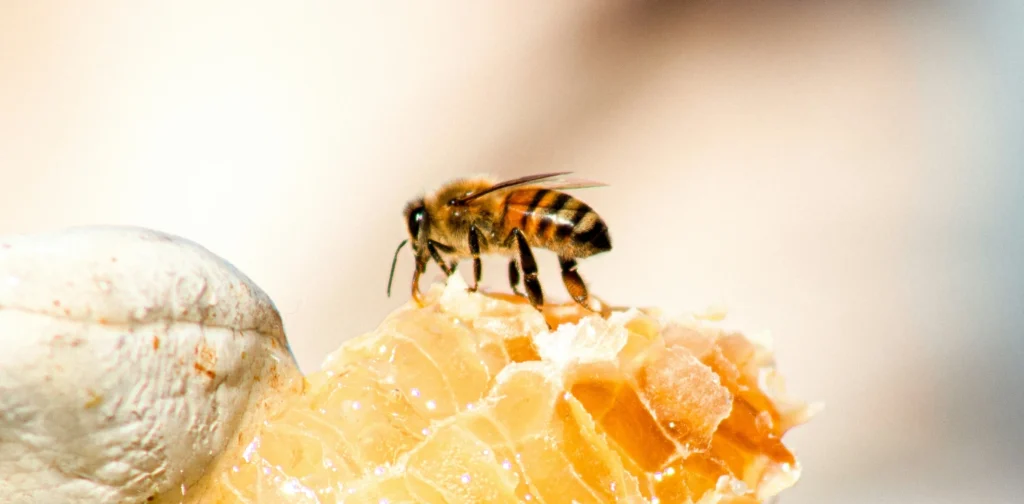Halting the Global Bee Decline

Photo: Meggyn Pomerleau on Unsplash.
From providing ecosystem services to socio-economic and cultural values, bees have an important role in our lives. However, these buzzing, tiny creatures are losing their population globally, signifying the urgent need to halt bee decline.
Bee Decline Worldwide
Around 35% of global crop production relies on pollinators like bees to produce healthy and nutritious fruits and seeds. Beyond generating a bigger quantity, bees also help cultivate crop yields with more variety and better quality, which can become another source of income for beekeepers. Additionally, honey hunting is a part of cultural practices for many Indigenous communities around the world.
However, the bee population is declining globally. A study by the World Wildlife Fund (WWF) and Buglife found that 17 species of bee have become locally extinct in the east of England alone. Southeast Asia, which has eight native honey bees, also experiences bee decline, although the exact number is still unknown due to the lack of a comprehensive overview.
There are several causes. A report by Bee:wild highlights a number of aspects that put pressure on bee populations. War and conflict, for instance, can lead to countries growing fewer types of crops and limit food sources for bees. Pollution also becomes a huge issue, with microplastics, antibiotic pollution, air pollution, and excessive pesticides contaminating beehives. Plus, more frequent and larger wildfires are destroying their habitats.
Solutions Through Research
Research plays a vital role in formulating innovative solutions to halt bee decline. For instance, a study led by the University of Oxford aims to produce richer and more nutritious food for bees through engineering yeast. Sterol-enriched yeast can boost colony growth compared to conventional bee feeds. This finding contributes to addressing the lack of quality and diverse food for bees to thrive, especially as artificial supplements are considered nutritionally incomplete.
Meanwhile, in Thailand, researchers are documenting and digitizing bee samples to enrich the database of local bee species. This data is especially crucial to support further research and bee conservation efforts in the country.
Still, these scientific findings can be further enhanced with the involvement of local wisdom. An IPBES report highlights the adoption of Indigenous and local knowledge as one of the potential solutions to address current challenges. Knowledge co-production between Indigenous wisdom and practices combined with scientific methods can enhance the understanding of pollinators, including bees, and aid in developing adaptive responses to climate change.
Good Governance Required
Our environment is facing mounting pressure from compounding crises, underscoring the need for more effective mitigation and adaptation strategies. Understanding the role of bees in supporting many aspects of our lives, from food to culture, is the first step in halting bee decline.
Moreover, while research is fundamental, fostering an enabling environment through good governance is also crucial. Establishing policies that address the root causes of bee decline, such as climate change and rampant pollution, and fostering collaboration between sectors are key to formulating effective interventions to address the issue.
Editor: Nazalea Kusuma

Co-create positive impact for people and the planet.
Amidst today’s increasingly complex global challenges, equipping yourself, team, and communities with interdisciplinary and cross-sectoral insights on sustainability-related issues and sustainable development is no longer optional — it is a strategic necessity to stay ahead and stay relevant.


 Women in Waste Management: Asia’s Circularity Runs on Women. Its Policies Still Don’t
Women in Waste Management: Asia’s Circularity Runs on Women. Its Policies Still Don’t  Embracing the Business Value of Sustainability
Embracing the Business Value of Sustainability  American Farmers Call for Government Support Amidst PFAS Contamination
American Farmers Call for Government Support Amidst PFAS Contamination  Asia Pacific’s SDG Progress Faces Major Setbacks
Asia Pacific’s SDG Progress Faces Major Setbacks  Exploring the Bidirectional Relationship Between Olympic Games and the Environment
Exploring the Bidirectional Relationship Between Olympic Games and the Environment  The Hidden Threat of Tire Pollution to Salmon Populations
The Hidden Threat of Tire Pollution to Salmon Populations